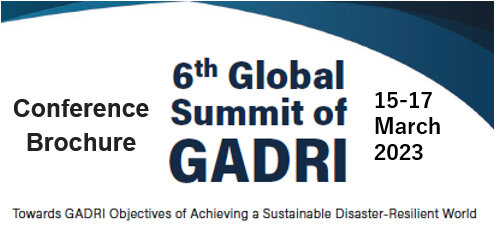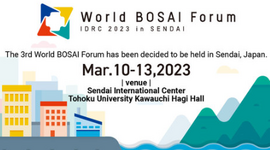This session will provide your institute with opportunities to network and connect with other institutes, and showcase your institute’s resources; to find potential partners among GADRI members to collaborate, engage and enhance ongoing or new research project activities.
For Applicants for poster presentation:
Detail of the space for putting up your poster:- It will be a poster presentation. Please print out the poster on your own and bring it with you. The space for putting up the poster is 180×120(Landscape).
Wide: 1800mm(180cm) * Height: 1200mm(120cm)[Landscape]
Please check your Presentation Number below table.
*Please print out the poster on your own and bring it with you.
*It is recommended that you put up your poster at the designated area from 13:00 - 17:00, 14 March or 9:00 – 15:30, 15 March.
*Core time will be from 16:10 to 17:00 hours on 16 March. Please move to the area of the poster venue and give your presentation in front of your poster.[>> Presentation Venue]
*Please take down your poster from the poster area during 9:00-12:00, 17 March.
*After 13:00, 17 March, if the poster are displayed, these will be removed and discarded by the GADRI Secretariat.
| No. | Title | Presenter | Institute |
| N01 | Report of activities developed at the Hydraulic Research Institute (IPH), Federal University of Rio Grande do Sul (UFRGS), Brazil | Masato Kobiyama, João Gabriel Fontes Maciel, Emanuel Fusinato, Alessandro Gustavo Franck | Hydraulic Research Institute, Federal University of Rio Grande do Sul, Brazil |
| N02 | Bridging governments and academia through research | Sandra Sotomonte | National Unit for Disaster Risk Management, Colombia |
| N03 | Inclusive Climate Action Programme at Sardar Patel University, India | Vibha S. Vaishnav | Electronics and Community Science Centre, Sardar Patel University, India |
| N04 | Assessment of Spatiotemporal Trends of Winter Warming in India using Global Climate Models |
Netrananda Sahu | Department of Geography, Delhi School of Economics, University of Delhi, India |
| N05 | Advanced Technologies for LandSlides (ATLaS) | Veronica Tofani | Department of Earth Sciences, University of Florence, Italy |
| N06 | International Training Course (ITC) on Disaster Risk Management (DRM) of Cultural Heritage (CH): Our Progress and Challenges Towards New Normal | Lata Shakya, Takeyuki Okubo, Dowon Kim | Ritsumeikan University, Institute of Disaster Mitigation for Urban Cultural Heritage (DMUCH), Japan |
| N07 | ATOMEX: Collaboration Сomplexity in Nuclear Emergency Preparedness in the Maritime Arctic | Natalia Andreassen, Rune Elvegaard, Emmi Ikonen, Andrey Kazakov | NORDLAB innovation center for emergency preparedness collaboration, Nord University, Norway |
| N08 | Sediment Transport Modelling | Ekkehard Holzbecher | German University of Technology in Oman (GUtech), Oman |
| N09 | Decision Making Support to Enhance Resilience in Slovakia | Katarína Hollá and Jozef Ristvej | University of Žilina, Faculty of Security Engineering, Department of Crisis Management, Slovakia |
| N10 | Supporting Emerging Disaster Risk Reduction Practitioners for a Smarter and Stronger DRR Workforce | Ava Sullivan and Lan Li | University College London, Centre for Digital Public Health in Emergencies (dPHE), United Kingdom |
| N11 | Action Orientated Data Impact in At Risk Marginalised Settings | Andrew Collins | Disaster and Development Network (DDN), Northumbria University, United Kingdom |
| N12 | Building Partnerships for Advancing Radar Technology and Science | Robert Palmer and Tian-You Yu | Advanced Radar Research Center, University of Oklahoma, USA |
| N13 | Wind Hazard and Infrastructure Performance Center | Kishor C. Mehta(1), Delong Zuo(1), Ioannis Zisis(2), Jean-Paul Pinelli(3) |
(1)Texas Tech University, (2)Florida International University, (3)Florida Tech, USA |
For instance:
- some institutes may have their own methodologies, datasets, experimental equipment, computer resources, etc., but lack users, application fields, in-situ data for validation, etc.
- Other institutes may have enough human resources (researchers) but many unsolved issues and in need of scientific knowledge, experience, experimental and observation equipment, and technological supports and vice versa.
This session will, in particularly, explore research seeds and needs and assist to realize the effective/active collaboration among GADRI members.
Don't miss this opportunity to find a potential partner for collaboration research activities.
Requirements:
- Please submit 1-page PPT slide (https://gadri.net/6gs/networking_form.pptx) to explain your “Seeds & Needs” for collaboration; and your expectation from a future partner within 300 words. See the attached templates.
- Please include a short message and your contact details (E-mail, institute/university/center name, etc.)
Submission instructions:
- Please use the link below to submit the 1-page PPT slide:
https://www.dropbox.com/request/6vvMPRgU1JXUF3gxlneZ(finished) - Send the 300-word summary together with your contact detail to the GADRI Secretariat using the e-mail address - abstract-6thgs@dpri.kyoto-u.ac.jp
- You are also required to register at the 6th Global Summit of GADRI registration siteith the “same name”.
- Deadline for the submission is
25th December 202220 January 2023.
Templates of 1-page PPT and the 300-word summary:
- The PPT slide template can be downloaded through this link: https://gadri.net/6gs/ppt_template.pptx
- 300-word summary template: https://gadri.net/6gs/summary_template.docx
Please note:
The 1-page PPT slide and your summary will be uploaded on the 6th Global Summit of GADRI website. Potential partners will be able to look at your documents prior to the Networking session. You will have a chance to discuss with your potential partner/s during the Networking session or at the summit.
Deadlines(extension):
20 January 2023 - Poster Session
20 January 2023 - GADRI Scholarships
20 January 2023 - Seeds and Needs - Networking with Institutes Session
20 January 2023 - GADRI Survey
15-17 March 2023 - 6th Global Summit of GADRI at DPRI, Kyoto University, Uji Campus, Kyoto, Japan






